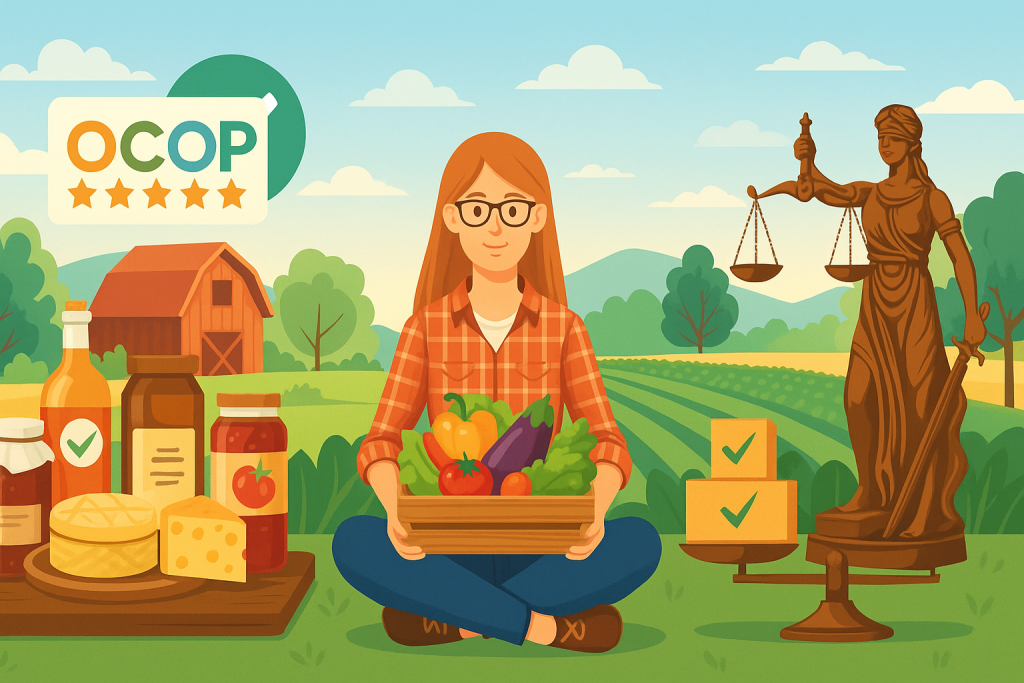
I. Introduction to the OCOP Program
The OCOP Program (One Commune One Product), approved by the Government under Decision No. 919/QĐ-TTg in 2018, is a key rural economic development initiative.
OCOP aims to promote internal resources such as local labor, cultural identity, intelligence, and creativity of each locality. Its ultimate goal is to improve the quality of life for rural residents and build new rural areas through the development of products that carry distinct brands and cultural characteristics of each region.
The implementation of OCOP must simultaneously meet market demands, create more jobs, and increase local incomes while ensuring the preservation of cultural and environmental values.
The program is being rolled out nationwide in rural areas and is expected to continue until 2025. In urban areas, where eligible products exist, provinces and municipalities may also organize implementation in line with local conditions.
1. What is an OCOP Product?
An OCOP product is a good or service that participates in the National OCOP Program. According to Decision 919/QĐ-TTg, OCOP products include local-origin goods and tourism services that carry branding, cultural identity, and competitive advantages of the locality.
OCOP products are evaluated and ranked at three levels: district, provincial, and national. After evaluation, products are awarded a star rating ranging from 1 to 5 stars. The certificate of recognition is valid for 36 months.
2. Categories of OCOP Products
According to Decision 148/QĐ-TTg, OCOP products are divided into six main groups:
- Food Products
- Fresh agricultural and aquatic products: vegetables, fruits, seeds, fresh meat, poultry, fish, eggs, fresh milk, etc.
- Semi-processed products: rice, cereals, processed seeds, fresh tea, etc.
- Processed products: tea, coffee, cocoa, etc.
- Other food products: spices, ready-to-eat foods.
- Beverages
- Alcoholic beverages: wine and other alcoholic drinks.
- Non-alcoholic beverages: natural water, mineral water, purified water, other soft drinks.
- Herbal Products and Derivatives
- Functional foods, traditional or modern medicines.
- Herbal cosmetics.
- Medical equipment and tools.
- Other herbal products.
- Handicrafts and Decorative Products
- Decorative handicrafts.
- Household handicrafts.
- Fabrics and garments.
- Ornamental Creatures
- Ornamental flowers.
- Ornamental plants.
- Ornamental animals.
- Community and Eco-Tourism Services / Tourist Attractions
- Community-based tourism services.
- Eco-tourism services.
- Local tourist attractions.
3. Criteria for Recognizing OCOP Products
3.1 Evaluation Criteria
According to Decision 148/QĐ-TTg, the recognition of OCOP products is based on the following criteria:
Part A – Product & Community Strength (40 points)
- Production must use local raw materials and labor.
- Encourage value-added processing, expansion of production scale, and linkage within value chains.
- Ensure environmental protection during production.
- Product development must reflect local traditions.
- Community strength is promoted through cooperative models, use of local labor, and transparent, effective business management.
Part B – Marketing Capacity (25 points)
- Distribution channels from local to international markets.
- Advanced quality management certification.
- Professional and consistent promotional activities.
- A compelling product story that reflects cultural identity.
Part C – Product Quality (35 points)
- Sensory, nutritional, and unique qualities that meet product standards.
- Compliance with legal production standards.
- Export potential, with encouragement for international quality certification.
3.2 Product Ranking
After evaluation, products are ranked into five levels:
- 5 stars (90–100 points): Premium products, meeting high standards, eligible for export.
- 4 stars (70–90 points): High-quality products with strong market potential, eligible for upgrade to 5 stars.
- 3 stars (50–70 points): Stable products with potential to upgrade to 4 stars.
- 2 stars (30–50 points): Products beginning to form clear quality characteristics, with potential for 3 stars.
- 1 star (1–30 points): Early-stage products, limited distribution, with potential for 2 stars.
4. Eligible Entities for OCOP Participation
The Government encourages participation from:
- Cooperatives and cooperative groups.
- Small and medium-sized local enterprises.
- Farms and registered household businesses.
For community-based tourism, eco-tourism, and local tourist attractions, other organizations such as associations, federations, and management centers may also participate.
II. Can a Household Business Be Recognized with Multiple OCOP Products?
Yes. The OCOP program evaluates and ranks each product or product group individually. There is no restriction on the number of products submitted by one entity (household businesses, cooperatives, enterprises, etc.).
For example, if a household business produces jam, fruit syrup, and herbal tea, each product can be submitted separately for evaluation and recognition under the OCOP program.
III. Conclusion
The OCOP (One Commune One Product) Program is a strategic policy to promote sustainable rural economic development, harnessing the unique strengths of each locality to create branded, high-value products.
The program provides comprehensive guidelines—from product definition and classification, to evaluation criteria, star ranking, and eligible participants. A key strength of OCOP is that it not only boosts consumption and economic value but also supports cultural preservation, landscape protection, and community development.
The star ranking system (1–5 stars) enhances transparency and motivates producers to improve quality, expand markets, and aim for export.
However, for OCOP to achieve sustainable impact, implementation must be accompanied by technical support, access to finance, human resource training, and systematic brand-building. Without these, OCOP risks becoming a formal label rather than a driver of long-term value creation.
📞 CONTACT LEGAL CONSULTANT:
TLA Law is a leading law firm with a team of highly experienced lawyers specializing in criminal, civil, corporate, marriage and family law, and more. We are committed to providing comprehensive legal support and answering all your legal questions. If you have any further questions, please do not hesitate to contact us.
1. Lawyer Vu Thi Phuong Thanh, Ha Noi Bar Association
Email: vtpthanh@tlalaw.vn
2. Lawyer Tran My Le, Ha Noi Bar Association
Email: tmle@tlalaw.vn
Khương Ngọc Lan

